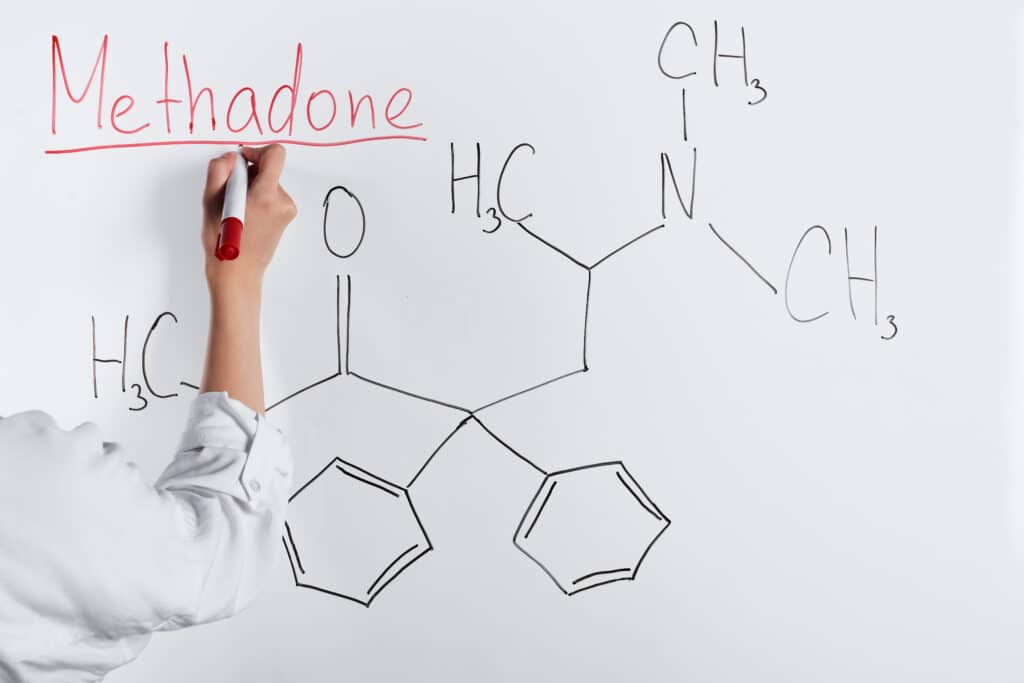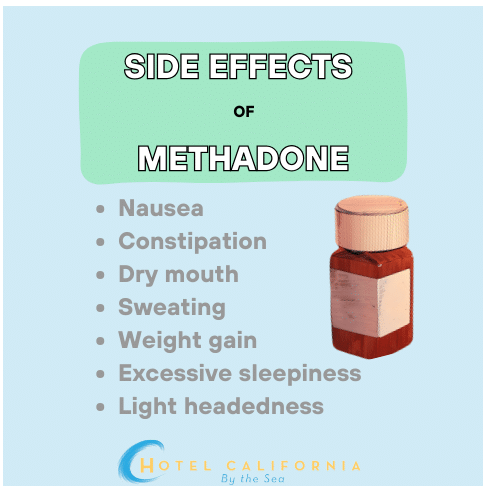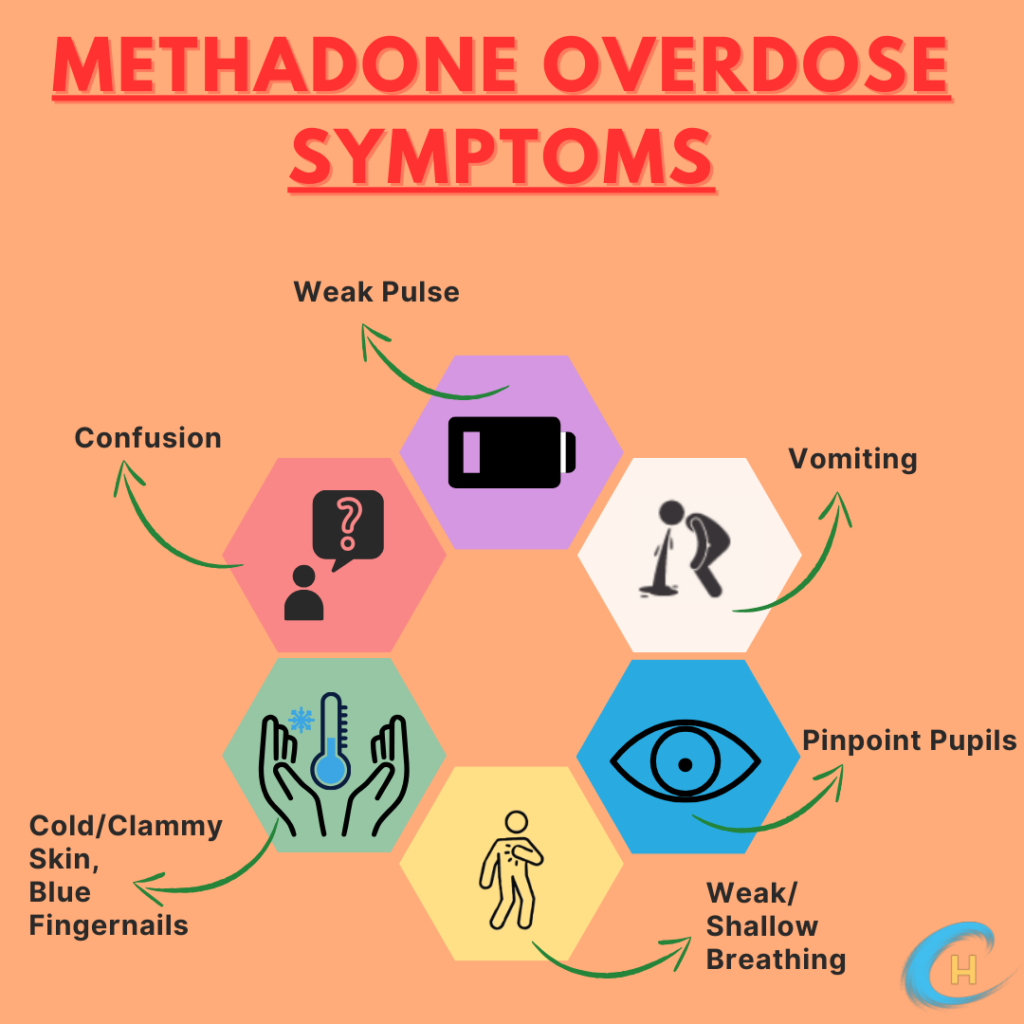Methadone Overdose Symptoms
Methadone, a man-made opioid prescription medication, is often used in the treatment of opioid use disorder. It can be used to treat chronic pain management, detox from opioids, part of medication-assisted treatments (MAT) and maintenance therapy for drug addiction. Using an opioid to treat an opioid addiction may seem contradictory. However, methadone maintenance programs have been scientifically proven to be among the most effective methods for treating addiction to heroin and other opioids.

Methadone is a long-acting full opioid agonist. It works by altering the way the brain and central nervous system respond to pain. It can help decrease painful symptoms associated with opioid withdrawal without producing euphoric effects typical of opioids. It is commonly prescribed during opioid addiction treatment to help reduce and ease the comforts of withdrawal symptoms and reduce or stop drug cravings. The Schedule II controlled substance can become addictive in itself.
How to Recognize a Methadone Addiction
A methadone addiction is not uncommon. Because the substance is an opioid, there is a risk of developing tolerance and dependence despite being used to treat more intense opioid addictions. Methadone comes in pill, liquid and wafer form. When ingested, methadone can remain active in the body between 24-36 hours. Its effects last longer than heroin. One dose of heroin only lasts up to a few hours. Due to its long-lasting nature, it remains in the body for much longer and can pose a greater risk of dependence and overdose.

Signs of a Methadone Addiction
- Increased tolerance. Users can develop an increased tolerance for the medication in which they continue to use and need more to feel its effects and feel “normal.”
- Withdrawal Symptoms. The presence of withdrawal symptoms is an indicator of a drug addiction. Users can experience unpleasant withdrawal symptoms after they stop using the drug. These symptoms can range from physical to psychological such as depression, cramps and insomnia
- Prioritizing Methadone. When users begin to prioritize the drug and use the drug over social and familial responsibility, this is a sign of a methadone addiction.
There is no level of safe drug use because all drugs come with risks. But, studies have shown when used as prescribed, methadone treatment is highly effective. A danger to consider with methadone treatment is the event of a methadone overdose.
Methadone Overdose Symptoms
Methadone overdose occurs when the user’s breathing has significantly slowed due to the suppression of breathing. This limits the amount of oxygen entering the brain and can result in coma, brain damage and death.
What is considered an overdose? Overdosing on a medication, substance or drug is when a user takes more than prescribed whether it is purposefully or accidentally. A typical average dose of methadone is about 60 milligrams per day. Taking larger or more frequent doses can lead to physical tolerance. In general, any dose over 100 milligrams per day can result in a high risk of overdose. The method of ingestion of a drug can affect the potency of the substance because certain modes of administration can yield more intense effects.
Overdose can also happen when a user partakes in polysubstance use and takes a combination of various powerful drugs. Methadone is especially dangerous when taken with anticonvulsants and other central nervous system depressants.
Because methadone is a long-acting medication, it can take longer for the effects to be felt and can stay in the body for longer than other opioid medications.
Some users are unaware and begin to take more medication in an effort to feel its effects. The build-up of medication can lead to a toxic amount and cause an overdose.

Symptoms of Methadone Overdose
- Low and swallowed breathing
- Slack muscles and muscle twitches
- Occasional seizures
- Drowsiness and dizziness
- Unconsciousness
- Cold and clammy skin with a blue-ish tint
- Weak pulse, slowed heartbeat and other vascular issues
- Low blood pressure
- Confusion
- Slurred speech
- Nausea, vomiting and other GI issues
Risk Factors that impact Methadone Overdose
- Demographics. Certain demographics can be a contributing factor in the risk of developing a methadone overdose. According to statistics, people with lower socioeconomic status are at higher risk for developing an overdose. This is due to these groups historically having less access to life-saving tools, resources and medications.
- Heart issues. Preexisting heart issues and respiratory and lung conditions can lead to decreased oxygen levels entering the brain and lead to a higher risk of respiratory depression.
- Brain damage and mental health conditions. Users who have sustained brain damage or experience mental health conditions are at greater risk for overdose.
- Relapse. Intense drug cravings often lead to relapse. Relapsing on a high dose of drugs can often lead to overdose.
- Polysubstance Use. Taking methadone with other substances increases the risk of dangerous side effects.
- Lack of awareness. In some cases, users lack awareness about the dangers of methadone. They believe because it was a prescription medication prescribed by a physician, it will always be a safe option. All medications have risks and methadone can come with higher risks than others due to its high potency.
Check Your Insurance Coverage for FREE
Find out if your insurance covers addiction treatment in minutes. We accept most insurance!
How to Treat Methadone Overdose
- Activated Charcoal. Activated charcoal is sometimes used to treat drug overdose. It is able to absorb the toxins in the stomach, which prevents the drugs from being absorbed into the bloodstream.
- Naloxone. Naloxone is an opioid overdose drug that works by reversing the side effects of opioids.
- Intubation. The process of intubation and mechanical ventilation is when a breathing tube is inserted through the mouth and into the lungs.
Does Methadone make you tired?
One common symptom of methadone use is tiredness, sleepiness and extreme fatigue. During methadone treatment, insomnia is prevalent. There are many reasons for this. Methadone is a medication that stimulates changes in the brain chemistry. Any shift or change in brain operation can disrupt sleep regulation and regular sleep patterns.
In some cases, it can lead to sleep deprivation and increased wakefulness during certain times of the day. This hinders regular brain functions by draining glycogen stores resulting in lower energy levels. Long bouts of wakefulness eventually lead to daytime sleepiness and difficulties completing everyday tasks. As a result, users find they have restless nights and a depletion of energy during the day. Users begin to experience slower reaction times, lack of alertness and a severe impact on cognitive processing and learning. People often see increased forgetfulness and can experience mental confusion.
Tiredness and sleep pattern abnormalities lead to a disruption in the body’s natural circadian rhythm. During the first year of methadone therapy treatment, clients may experience more drowsiness compared to another patient in long-term therapy whose body has already adjusted to the changes caused by methadone.
Ways to combat Tiredness caused by Methadone
- Adjusting the methadone dosage to an appropriate level for each patient
- Exercise, get and stay active
- Decrease stress levels
- Stay hydrated and drink plenty of water
- Stay on top of nutrition
Reach out to Hotel California by the Sea
We specialize in treating addiction and other co-occurring disorders, such as PTSD. Our Admissions specialists are available to walk you through the best options for treating your addiction.
Treatment for Methadone addiction and Opioid addiction
Opioid use disorder has become a crisis across the United States and globally. Alarmingly, opioid overdose death is on a continued steady rise. Methadone medication therapy is often a treatment used to help those who are struggling with opioid abuse. But, because methadone is also an opioid, some have found themselves falling victim to methadone dependence and addiction. Treatment at a behavioral health program such as Hotel California by the Sea provides the best opportunities to overcome substance addiction.
At Hotel California, we provide all levels of care including detox, residential and outpatient programs. During detox, clients may receive medication management treatments or forms of long-term medication management. Throughout the duration of residential and outpatient programs, clients will continue with any medication treatments as well as integrate individual and group therapies. Such treatments include CBT, DBT and family therapy. Our opioid use disorder treatment program is designed with the individual client in mind and created through custom treatment plans. We believe in building a unique treatment course for each client in order to achieve sobriety and recovery.
References:
https://www.nhs.uk/medicines/methadone/#:~:text=Too%20much%20methadone%20may%20make,effects%2C%20take%20the%20naloxone%20immediately
https://baartprograms.com/resources/blog/why-does-methadone-make-you-tired/
https://vertavahealth.com/methadone/overdose/
https://anrclinic.com/blog/methadone-overdose/
https://zinniahealth.com/substance-use/methadone/overdose
https://adf.org.au/drug-facts/methadone/
https://www.addictioncenter.com/opiates/methadone/symptoms-signs/
https://medmark.com/resources/blog/why-does-methadone-make-me-feel-so-tired/
